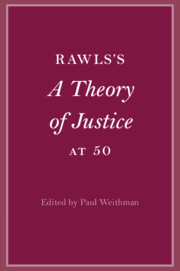Book contents
- Rawls’s A Theory of Justice at 50
- Cambridge Philosophical Anniversaries
- Rawls’s A Theory of Justice at 50
- Copyright page
- Dedication
- Contents
- Figures
- Contributors
- Acknowledgments
- Abbreviations of and Bibliographic Information for Rawls’s Works
- Introduction
- Part I Rawls and History
- Part II Developments between A Theory of Justice and Political Liberalism
- Part III Rawls, Ideal Theory, and the Persistence of Injustice
- Part IV Pluralism, Democracy, and the Future of Justice as Fairness
- 14 Public Reason at Fifty
- 15 Reasonable Political Conceptions and the Well-Ordered Liberal Society
- 16 Religious Pluralism and Social Unions
- 17 One Person, at Least One Vote?
- 18 Reflections on Democracy’s Fragility
- 19 A Society of Self-Respect
- References
- Index
19 - A Society of Self-Respect
from Part IV - Pluralism, Democracy, and the Future of Justice as Fairness
Published online by Cambridge University Press: 20 July 2023
- Rawls’s A Theory of Justice at 50
- Cambridge Philosophical Anniversaries
- Rawls’s A Theory of Justice at 50
- Copyright page
- Dedication
- Contents
- Figures
- Contributors
- Acknowledgments
- Abbreviations of and Bibliographic Information for Rawls’s Works
- Introduction
- Part I Rawls and History
- Part II Developments between A Theory of Justice and Political Liberalism
- Part III Rawls, Ideal Theory, and the Persistence of Injustice
- Part IV Pluralism, Democracy, and the Future of Justice as Fairness
- 14 Public Reason at Fifty
- 15 Reasonable Political Conceptions and the Well-Ordered Liberal Society
- 16 Religious Pluralism and Social Unions
- 17 One Person, at Least One Vote?
- 18 Reflections on Democracy’s Fragility
- 19 A Society of Self-Respect
- References
- Index
Summary
Rawls’s Original Position, the most influential thought experiment in modern political philosophy, cannot be the justification of Rawls’s theory of justice as fairness. The Original Position cannot satisfy Rawls’s own publicity condition, which requires justifications that are accessible to all citizens. I hypothesize that over time Rawls weakened his publicity condition because he saw this tension, but that he could not resolve it. However, Rawls’s work contains a justification for justice as fairness that is publicly accessible: that in a well-ordered society, all citizens can have self-respect. I set up this discussion with Rawls’s critique of meritocracy, which, Rawls fears, sets citizens against each other in a zero-sum competition for self-respect. In a meritocracy, elites display their power and wealth, while the less fortunate may fall into resentment, rancor, and possibly a destructive racial nationalism. A Rawlsian society of self-respect offers a more just and stable model of social unity.
- Type
- Chapter
- Information
- Rawls’s A Theory of Justice at 50 , pp. 336 - 355Publisher: Cambridge University PressPrint publication year: 2023

